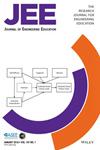Compassion and engineering students' moral reasoning: The emotional experience of engineering ethics cases
Abstract
Background
There has been an increase in interest in emotion in engineering and science ethics education. There is also evidence that emotional content in case studies may improve students' learning and enhance awareness, understanding, and motivation concerning ethical issues. Despite these potential benefits, however, emotions' relationship to moral reasoning remains controversial, with ongoing debate as to how much and in what way emotional content impacts on moral reasoning. Furthermore, only limited empirical research has explored how emotions affect students' moral reasoning in educational settings.
Purpose
The purpose of this study was to determine whether mild to moderate compassion-induced engineering ethics case contents affected the moral reasoning schemas activated in students.
Design/Method
We conducted experimental research using the Engineering and Science Issues Test (ESIT). First, we modified the six case studies of the ESIT, to increase the compassion associated with the cases' protagonists to a mild to moderate level. We tested this instrument with 207 participants to ensure the changes did affect compassion without impacting on other potential emotions. Then, in a second study with 305 participants, we investigated whether the changed compassion intensity of the protagonists in the case studies affected the moral reasoning schemas activated in participants.
Results
The induction of mild to moderate compassion did not impact the moral reasoning schemas activated. Findings also show that we managed to affect compassion intensity in the case studies without changing other emotions.
Conclusion
This study reveals how to include a targeted emotion in engineering case studies in order to improve students' learning without affecting the moral reasoning schemas activated.

 求助内容:
求助内容: 应助结果提醒方式:
应助结果提醒方式:


